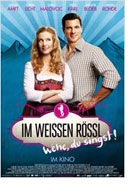

Opening 7 Nov 2013
Directed by:
Christian Theede
Writing credits:
Jan Berger
Principal actors:
Diana Amft, Gregor Bloéb, Julia Cencig, Fritz Karl, Aykut Kayacik
Here is a wonderful chance to seep into theatrical history as well as enjoy an entertaining film. The Weißen Rössl (The White Horse Inn) is a hotel in Austria, specifically in the area of Salzburg, Salzkammergut, at Wolfgangsee (Lake) in St. Gilgen. In this love story Wilhelm goes to Wolfgangsee to bury his wife, according to her last-wish instructions. Their daughter Ottilie, a real city girl from Berlin, only agrees to accompany him to this bleak (she thinks) countryside in order to get away from it all after her boy friend ditches her. The hotel is the scene of Austrian dirndls, Schuhplattler (Bavarian dancers), eternal sunshine, singing waitresses, and it all seems perfectly appropriate in this setting – a setting inviting to true love. And it works: love grows between Ottilie and Dr. Siedler, between Leopold and Josepha, Sigi and Klärchen, with all the accompanying ups and downs. The atmosphere is enchanting, fairy tale, far from the modern world, a place that beckons to us to leave our cares behind.
Im Weißen Rössl was a play written in 1896 by Oskar Bumenthal and Gustav Kadelburg. In 1926 it was a silent movie. In 1930 songs were added by Ralph Benatzky and others to turn it into an operetta, which toured Europe and ended up on Broadway in 1936. The Nazis forbid it as entartet (degenerate). It has been filmed seven times; probably the most famous version was in 1960 starring Germany’s favorite actor Peter Alexander (who died in 2011). No wonder that this popular story has returned to the big screen, this time with 13 original songs, plus five new ones. It’s as if the Gershwins were back with Porgy and Bess, or Noel Coward back with Anything Goes. The subtitle Wehe du singst (woe be it, if you sing) is, of course, understated dry humor. I went into the press showing, expecting to be bored. What a surprise when I, and many colleagues, came out singing, happily discussing our favourite scenes. This is not only enjoyable, but also a piece of both German and world musical history. There might be a language problem, though the music will well compensate. (Becky Tan)